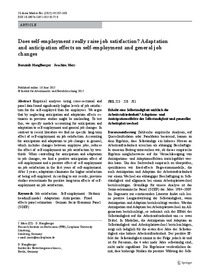Does self-employment really raise job satisfaction? Adaptation and anticipation effects on self-employment and general job changes

Hanglberger, Dominik ; Merz, Joachim
Journal for Labour Market Research
2015
48
4
December
287-303
job satisfaction ; self employment ; statistics ; survey
Personnel management
https://labourmarketresearch.springeropen.com/articles/10.1007/s12651-015-0175-8
English
Bibliogr.
"Empirical analyses using cross-sectional and panel data found significantly higher levels of job satisfaction for the self-employed than for employees. We argue that by neglecting anticipation and adaptation effects estimates in previous studies might be misleading. To test this, we specify models accounting for anticipation and adaptation to self-employment and general job changes. In contrast to recent literature we find no specific long-term effect of self-employment on job satisfaction. Accounting for anticipation and adaptation to job changes in general, which includes changes between employee jobs, reduces the effect of self-employment on job satisfaction by two-thirds. When controlling for anticipation and adaptation to job changes, we find a positive anticipation effect of self-employment and a positive effect of self-employment on job satisfaction in the first years of self-employment. After 3 years, adaptation eliminates the higher satisfaction of being self-employed. According to our results, previous studies overestimate the positive long-term effects of self-employment on job satisfaction."
Digital
The ETUI is co-funded by the European Union. Views and opinions expressed are however those of the author(s) only and do not necessarily reflect those of the European Union or the ETUI.